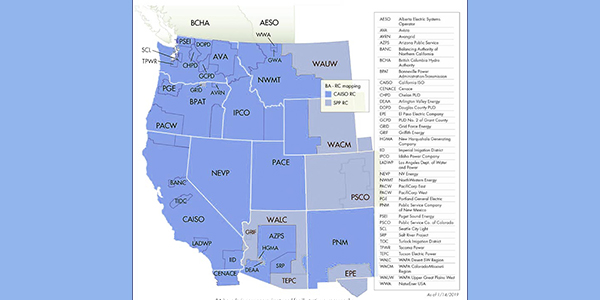By Hudson Sangree
The key players in the Western reliability coordinator transition said Wednesday they’re largely on track to take over from Peak Reliability on a staggered timeline from July to December.
“Overall, our project is on schedule, and we’re making changes needed to be ready in August,” Bruce Rew, SPP’s vice president of operations, told the Western Electricity Coordinating Council’s RC Forum in a web-only meeting.
SPP and CAISO will be the main RCs for the Western states, while BC Hydro will assume responsibility for most of British Columbia. Gridforce will serve several small balancing areas in Arizona, Oregon and Washington. Alberta Electric Service Operator will continue performing the RC function in its province, rounding out the Western Interconnection.
Each entity provided an update on its progress Wednesday, and Peak described its gradual wind down as it exits the RC business this year.
CAISO’s RC West will start the handoff when it takes over RC services for its California territory July 1. The ISO is awaiting final certification from NERC, which it expects to receive “any day now,” Tim Beach, RC West’s director of operations told the forum. (See RC West Moving Smoothly Toward July Handover.)
RC West staff members are in the second phase of shadowing Peak employees and have already been involved in problem situations, including a high-voltage event last weekend in California that required switching a transmission line out of service to mitigate the problem, Beach said.
After July 1, RC West will be preparing for Nov. 1, when it assumes the RC role for most of the West; 39 entities have contracted for its services from the Canadian border to northern Baja California and from the Pacific Ocean to the Rocky Mountains.
SPP has agreements with 13 customers, 11 of which have completed connecting with SPP, Rew said. The utility will start its certification process with WECC and NERC in August in anticipation of going live Dec. 3. (See SPP on Track for WECC RC Certification.)
Gridforce President C.J. Ingersoll said that as a relative newcomer, the company is in “catchup mode” but with its small footprint, things should work out fine.
“Our target go-live date is Dec. 3, and we feel like we’re on track there,” Ingersoll said.
Asher Steed, BC Hydro’s manager of provincial reliability coordination operations, said the company’s employees will start shadow operations with Peak on July 8 as it ramps up for its Sept. 2 start date.
Peak said all is going as planned on its end. Losing key staff members was a major concern earlier this year, but the company’s retention policies, including severance packages, appear to have worked, Chief Administrative Officer Rachel Sherrard said.
“We’ve had some unplanned attrition. Not a lot.” The company has shrunk from more than 160 employees in May 2018 to 119 today, she said.
Peak will start decertifying Dec. 4, vacate its offices in Vancouver, Wash., and Loveland, Colo., and cease to be a company by May 2020.
Eric Whitley, a grid expert from Folsom, Calif., who serves on WECC’s RC Transition Coordination Group, said “Peak will not be operational after the last transition on Dec. 3. There’s no going backwards,” he warned. Peak has posted a banner on its website showing the countdown to when it ceases operations.
The forums will continue every two or three months, as needed, Whitley said.
“It’s going to be a very active rest of the year,” he said.




